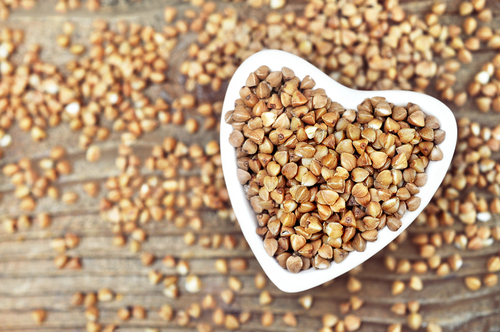6 Amazing Plant-Based Protein Sources
Whether you are vegetarian, transitioning to a plant-based diet or just wanting to bring in more meatless days of eating… Here are some superb sources of plant-based foods high in protein.
Quinoa and Buckwheat
These two grains (they are actually seeds) shine in a plant-based diet as they are both complete proteins (they contain all nine essential amino acids) and are both high in lysine, which is an amino acid commonly low in vegetarians and is important to tissue growth and repair.
Buckwheat is a rich source of B vitamins, full of minerals such as, magnesium, potassium, phosphorus, manganese, calcium, zinc and selenium. Since buckwheat contains the two essential amino acids lysine and arganine, which aren’t found in many other whole grains, adding it to your diet ensures you are getting the full range of amino acids that the body needs. This wonderful antioxidant seed provides highly digestible protein, especially when sprouted, and its fiber content supports good digestion.
Quinoa has the highest protein of all the grains and is also a great source of fiber. It is good source of iron, magnesium, phosphorus, calcium and is high in the B vitamins as well as vitamin E and K. Another benefit, is its flavanoid content, which are antioxidants important in the reduction of inflammation. Whipping up a bowl of overnight soaked quinoa, adding any vegetables, fruits, nuts and/or seeds provides you with a very nourishing way to greet the day!
Hemp
All amino acids essential to health are found in hemp seeds. Hemp is free of trypsin inhibitors, which block protein absorption and oligosaccharides, which can cause stomach upset and gas, making it easily digestible. This superfood is an excellent source of essential fatty acids, with a balanced ratio of omega 6 to omega 3 (at 3:1) and gamma linolenic acid, which promotes cellular health. It is rich in vitamin E and the minerals phosphorus, potassium, sodium, calcium, iron, magnesium and zinc. Sprinkling a tablespoon or two to any dish or adding them to salad dressings is a great way to boost your protein intake.
Tempeh
Tempeh is a fermented soy-based food that is protein packed. Due to the fermentation process, tempeh flaunts an increase in its bioavailability of vitamins and contains probiotics to fuel the good bacteria in your body. The calcium provided leads to an increase in bone density and faster muscle recovery. Adding baked tempeh to a plate of vibrant greens provides you with the same protein quality as meat, and I personally find that the texture and satiation easily and deliciously replaces the meat craving.
Spirulina and Chlorella
These two chlorophyll rich blue-green algaes are highly bioavailable complete protein sources. Both are rich in B vitamins and provide amazing detoxifying and cleansing properties
At 60% protein (the highest of any natural food), spirulina is also a source of B12, a vitamin lacking in the vegetarian diet (although there is contradictory information on the absorption of b12 in this form). This energy and brain booster is a good source of magnesium, zinc, vitamins A and K, and is rich in iron.
Chlorella is a powerful detoxification aid that binds to heavy metals such as, cadmium, uranium and mercury and removes them while simultaneously strengthening the immune system. Also, this superfood boosts healthy cell growth, regenerates tissues in the body and helps repair torn muscle cells, so no wonder it is a go to for lots of vegetarian athletes!
Adding a teaspoon or two of either green food to your morning smoothie is an nice way to get a rich source of protein, charge your energy and lift your spirit… Thanks to mother nature for all she provides!


